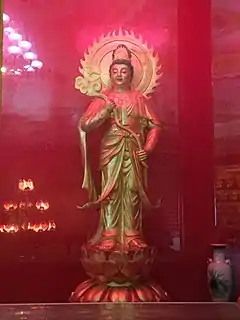| Sūryaprabha | |
|---|---|
 Sūryaprabha, Tiantan Garden, Shantou | |
| Sanskrit | सूर्यप्रभ
Sūryaprabha |
| Chinese | 日光菩薩 (Pinyin: Rìguāng Púsà) 日光遍照菩薩 (Pinyin: Rìguāng Biànzhào Púsà)) 日光普照菩薩 (Pinyin: Rìguāng Pǔzhào Púsà) 日曜菩薩 (Pinyin: Rìyào Púsà |
| Japanese | 日光菩薩 (romaji: Nikkō Bosatsu) 日光遍照菩薩 (romaji: Nikkō Henjō Bosatsu) 日光普照菩薩 (romaji: Nikkō Fushō Bosatsu) 日照王菩薩 (romaji: Nisshō Ō Bosatsu) |
| Korean | 일광보살 (RR: Ilgwang Bosal) 일광변조보살 (RR: Ilgwang Byeonjo Bosal) 일요보살 (RR: Ilyo Bosal) |
| Tagalog | Sulyaplabha |
| Thai | พระสุริยประภาโพธิสัตว์ |
| Tibetan | ཉི་མའི་འོད་ Wylie: nyi ma'i 'od THL: nyimé ö |
| Vietnamese | Nhật Quang Bồ Tát |
| Information | |
| Venerated by | Mahayana, Vajrayana
|
Sūryaprabha (literally "Sunlight", Chinese: 日光菩薩; pinyin: Rìguāng Púsà; Rōmaji: Nikkō Bosatsu) is a bodhisattva whose specialty is sunlight and good health. Sūryaprabha is often seen with Candraprabha, as the two siblings serve Bhaiṣajyaguru. Statues of the two closely resemble each other and are commonly found together, sometimes flanking temple doors. They are also recognized in mainland Asia as devas.
In Chinese folk religion, the solar god Taiyang Xingjun is depicted as his incarnation.
His sacred day is the first day of the second lunar month in the Chinese calendar.
See also
References
This article is issued from Wikipedia. The text is licensed under Creative Commons - Attribution - Sharealike. Additional terms may apply for the media files.